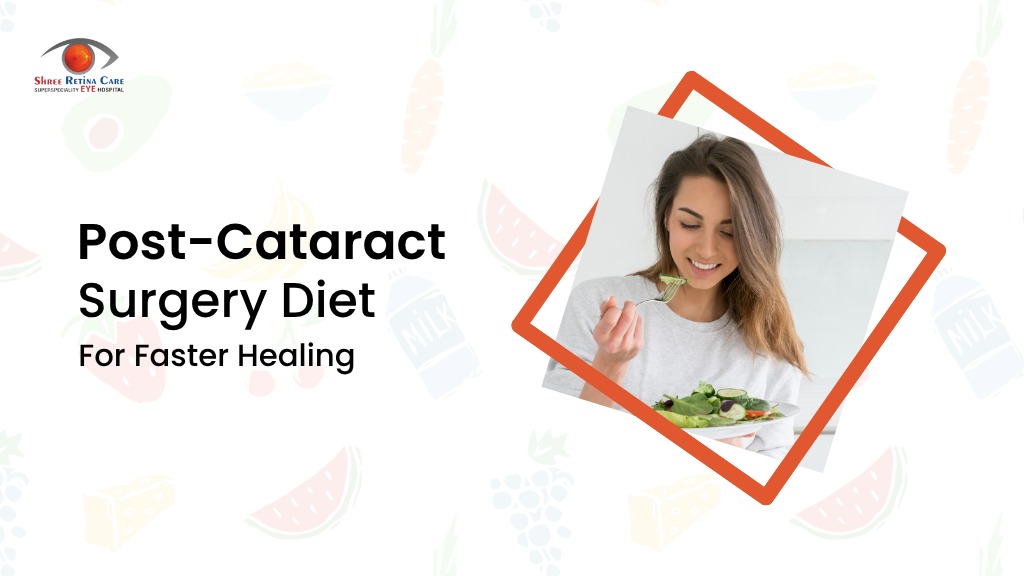Post-Cataract Surgery Diet For Faster Healing
Cataract removal surgery is a highly successful procedure that helps to give clarity to the eyesight. But many people don’t realize that the journey to better eyesight doesn’t end in the operating theatre. The days and weeks after surgery are just as important, especially when it comes to healing well. One of the most overlooked but helpful things you can do during recovery is to eat the right food.
Yes, your plate matters too. The food you eat plays a big role in helping your eyes heal faster and feel better. If you’re wondering what to eat after cataract surgery, this blog will give you clear and useful answers.
Why Is Diet Important After Cataract Surgery?
Once cataract surgery is done, your body starts healing naturally on its own. While the surgery itself is quick and painless, your eye tissues still need time to recover. Eating nourishing food gives your body the strength to repair itself, reduce inflammation, and avoid infections.
Just like how fuel helps a car run better, good food helps your body heal better.
What To Eat After Cataract Surgery: Key Nutrients That Matter
Let’s break it down into simple food groups and nutrients that actually help your eyes heal:
1. Vitamin C-Rich Foods
Vitamin C supports your immune system in battling infections and aids in the healing and restoration of body tissues. It also supports collagen production, which helps in healing wounds.
Good food sources:
- Oranges, lemons, and sweet lime
- Amla (Indian gooseberry)
- Strawberries
- Guava
- Bell peppers
Why it matters: After surgery, your eyes may feel sensitive. A vitamin C-rich diet helps reduce swelling and supports faster healing.
2. Leafy Green Vegetables
Green veggies like spinach and kale are full of lutein and zeaxanthin—natural plant nutrients that protect your eyes.
Good food choices:
- Spinach
- Kale
- Methi (fenugreek leaves)
- Coriander and curry leaves (in chutneys or dal)
Why it matters: These veggies help your eyes stay healthy and prevent further damage from light or stress.
3. Protein-Rich Foods
Protein serves as the fundamental component that makes up every cell in your body. After surgery, your tissues need protein to heal.
What to eat after a cataract operation for protein:
- Dals and pulses
- Paneer or tofu
- Curd or yogurt
- Eggs (if allowed by your doctor)
- Fish or lean chicken (if non-vegetarian)
Tip: If you’re vegetarian, combine dal with rice or roti to get a complete protein meal.
4. Foods with Healthy Fats
Not all fats are bad. Good fats assist in the absorption of important vitamins for eye health, such as vitamins A, D, E, and K.
Examples:
- Nuts like almonds and walnuts
- Seeds like flaxseeds or chia seeds
- Olive oil or mustard oil
- Fish (like salmon, if allowed)
Why it helps: Fats also support eye moisture and reduce dryness after surgery.
5. Whole Grains and Fiber
Whole grains help maintain good energy levels and keep your digestion smooth, especially if you’re on medication.
Good options include:
- Brown rice
- Whole wheat roti
- Oats
- Dalia (broken wheat)
- Quinoa
Why it helps: Eating balanced carbs prevents fatigue and keeps your energy up during recovery.
6. Hydrating Foods and Fluids
Water is your best friend after surgery. Drinking enough water aids in removing toxins from the body and promotes faster healing.
What to include:
- 7–8 glasses of water daily
- Fresh coconut water
- Homemade soups or broths
- Cucumber, watermelon, or oranges
Avoid sugary drinks or packed juices—they may look healthy but often contain added sugar.
Foods To Avoid After Cataract Surgery
Now that we’ve talked about what to eat, let’s also touch on what not to eat after cataract surgery. These foods can delay healing or make you feel worse.
Avoid:
- Spicy or fried food
- Junk food like chips, burgers, or street food
- Processed food like instant noodles or ready-to-eat packets
- Too much sugar (sweets, cakes, soda)
- Too much salt
- Alcohol or smoking (slows down healing)
These foods can increase inflammation in your body and may interfere with medications.
Sample Daily Diet Plan (For General Guidance Only)
Here’s a simple vegetarian-friendly diet idea. Make sure to adjust it to your health needs and preferences.
Morning:
- Warm water with lemon
- 5 soaked almonds
- A bowl of fresh fruits like papaya or orange
Breakfast:
- Vegetable poha/upma with veggies
- Herbal tea or coconut water
Mid-morning Snack:
- Amla juice or fresh fruit
Lunch:
- 2 whole wheat rotis
- Dal
- Stir-fried spinach or methi
- Curd
Evening Snack:
- Roasted makhana or nuts
- Green tea
Dinner:
- Light khichdi or soup
- Steamed vegetables
- A small bowl of curd
Before Bed:
- Warm turmeric milk (optional and only if advised)
Other Helpful Tips Along With Diet
- Take your medicines on time – make sure to take the dose as advised by your doctor.
- Avoid bending or rubbing your eyes—make sure not to while eating or moving around.
- Get enough rest—don’t stress your eyes too much by using screens.
Also read: How Long Should You Rest After Cataract Surgery?
- Eat slowly and chew well—this helps your digestion, especially if you’re on medication.
- Follow your doctor’s food-related advice if you have conditions like diabetes or high BP.
Healing Is A Team Effort—And Food Plays A Big Part
After cataract surgery, most people focus only on eye drops and doctor visits. But healing from the inside also matters. Eating the right food is a simple but powerful way to support your recovery.
So, if you’re wondering what to eat after a cataract operation, remember this: keep it simple, fresh, and full of natural nutrients. Your body—and your eyes—will thank you.
Let food be your gentle medicine. And let your recovery be smooth, healthy, and full of clearer vision ahead.

